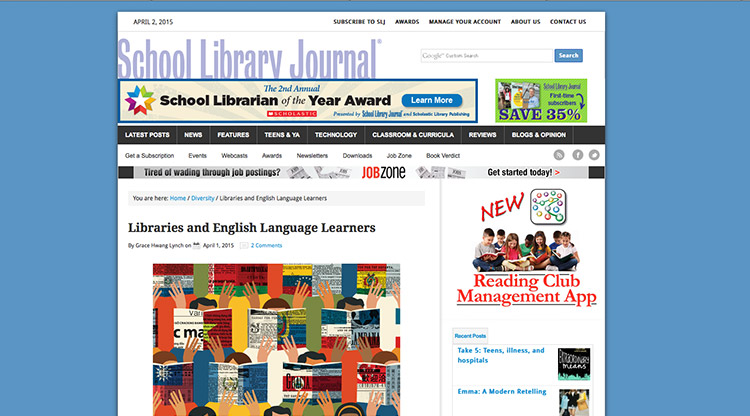One of the topics I’ve always been interested in is how changing race and ethnic demographics affect education and language learning. So when I had the opportunity to report on the state of library services for English Language Learners, I was eager to find out what was going on. It is an incredibly broad topic, ranging from urban public libraries on the East and West Coasts with large, well-established ethnic groups, to a Midwestern city that’s home to large Hmong and Somali populations. And school libraries serving many ELL students face different challenges, yet, especially with the changing curriculum standards.
Read the full ELL article Libraries and English Language Learners at School Library Journal.


The situation of school libraries is really tough because librarians in the 21st century are constantly battling the perception of the public and funders, that libraries are less important because of the Internet, tv or electronic formats.
It’s HARD. I say this as a professional librarian. I’ve never been a children’s librarian but know from reading the recent professional literature, from professional librarian-teacher friends and understanding budget cuts in school systems, sometimes it has been the school library that gets cut first.
I agree ELL or ESL material that has been curated by professional school teacher-librarian is important combined with relevant effective programming. Librarians do have to market their programs aggressively (in a nice way) and this is one trait not all librarians have.
It helps if the librarian at least does have some roots from the communities they serve or at least knows a 2nd non-English language so that they understand the challenges of learning English plus retention of mother tongue for harmonious family communication. The latter is very important for long term mental health matters and growing healthy families.
I just posted a blog post about losing/hanging onto a mother tongue. I was struck by some regulars who are unilingual English who genuinely have no idea how difficult it is to learn English and to retain first mother language. Even those of us who have lousy bilingualism, take for granted what others should understand, but they don’t know.
https://cyclewriteblog.wordpress.com/2015/04/01/hanging-onto-my-broken-mother-tongue/
I didn’t know you were a librarian, Jean!
And I think your point about needing librarians that have the same cultural identity or at least linguistic fluency in the language of the people they are serving is important, both to understand where the patrons are coming from and also to help foster two-way learning. My parents wanted me to learn English to be able to succeed in school and in the US, in general. But my English abilities soon outgrew theirs, and it’s always been hard to communicate about more than basic issues with them. I always wondered if our relationship would be closer if we could speak the same language with the similar levels of fluency.
Also, sometimes, I don’t realize how much Mandarin or Taiwanese I actually understand until I’m in a conversation and my husband and kids have no clue what’s going on, but I at least have a general idea.
As our parents age, it becomes more painful that we cannot fully understand some complex stories and memories of theirs. So we’re left with basic gist/outline of their stories.
I’m not sure we would a lot closer to our mother if we were a lot more fluent in Chinese, given her temperament. But it would give her greater flexibility to express more deeply what she thought.
Ah….at least parents who raised us, figure out some shorthand ways of communication with their own chidlren. Better than nothing. I feel especially sorry for adopted Asian children with Caucasian parents some who never find their birth family roots. It must a missing piece of their family identity that is never passed on to them.